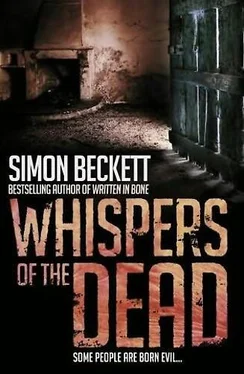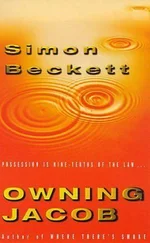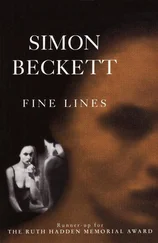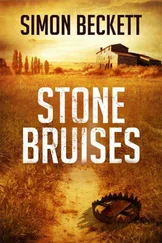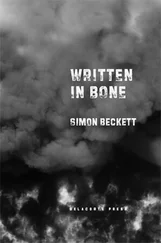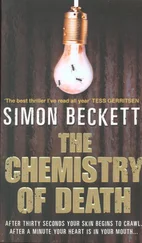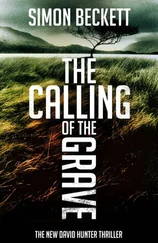The sunlight was abruptly blotted out as a black pick-up truck drew up alongside. It towered over the car, a petrol-guzzling monstrosity with tinted windows, then quickly pulled ahead. It had only just cleared us when suddenly it cut into our lane. My foot stamped reflexively on to the floor as I braced for a collision. But with barely a touch on the brake, Jacobsen swerved into the other lane, as smoothly as though the move were choreographed.
It was a cool display of driving, all the more impressive because she appeared unaware of it. She flicked an irritated glance at the pick-up as it accelerated away, but otherwise dismissed it.
The incident broke the mood, though. She grew distant again after that, either preoccupied with what we’d said or regretting saying as much as she had. In any event there wasn’t any more time for conversation. We were already approaching the centre of Knoxville. My spirits sank further the closer we got. Jacobsen dropped me back at my hotel, her reserve now as unassailable as any wall. Her sunglasses hid her eyes as she drove off with the briefest of nods, leaving me on the pavement, stiff-muscled from hunching over in the pine woods.
I felt at a complete loss as to what to do next. I didn’t know if my exclusion extended to the morgue, and didn’t want to phone Tom to ask. Nor did I feel like going out to the facility, not until I’d a better idea of how things stood.
Standing there in the bright spring sunshine, with people bustling around me, the full extent of what had happened finally sank in. While I’d been with Jacobsen I’d been able to keep it at arm’s length, but now I had to face up to it.
For the first time in my career I’d been thrown off an investigation.
I showered and changed, then bought a sandwich and ate lunch at the side of the river, watching the tourist-carrying paddleboats churn past. There’s something about water that’s primordially soothing. It seems to touch some deep chord in our subconscious; stir some gene memory of the womb. I breathed in the faintly swampy air, watching a flight of geese heading upriver, and tried to tell myself that I wasn’t bored. Objectively, I knew I shouldn’t take what had happened at the cemetery personally. I’d been caught in Hicks’s crossfire, collateral damage of professional politics that didn’t concern me. I told myself that I shouldn’t regard it as a loss of face.
It didn’t make me feel any better.
After lunch, I wandered aimlessly around the streets, waiting for my phone to ring. It was a long time since I’d been in Knoxville, and the city had changed. The trolley cars were still there, though, and the golden mirror-ball of the Sunsphere remained an unmistakable feature on the skyline.
But I wasn’t in the mood for sightseeing. My phone remained stubbornly silent, a dead weight in my pocket. I was tempted to call Tom, but I knew there was no point. He’d ring me when he could.
It was late afternoon when I finally heard from him. He sounded tired as he apologized for what had happened that morning.
‘It’s just Hicks trying to stir up a fuss. I’m going to talk to Dan again tomorrow. Once the dust has settled I’m sure he’ll see sense. There’s no reason why you can’t carry on working with me at the morgue, at least.’
‘What are you going to do in the meantime?’ I asked. ‘You can’t manage by yourself. Why don’t you let Paul help?’
‘Paul’s out of town today. But I’m sure Summer will lend a hand again.’
‘You need to take it easy. Have you seen a doctor yet?’
‘Don’t worry,’ he said, in a tone of voice that told me I was wasting my breath. ‘I’m really sorry about this, David, but I’ll sort it out. Just sit tight for now.’
There wasn’t much else I could do. I resolved to try to enjoy the rest of the evening. A little leisure time won’t kill you. The bars and cafes had started filling up, office workers stopping off on their way home. The murmur of laughter and conversation was inviting, and on impulse I stopped at a bar with a wooden terrace overlooking the river. I found a table by the railing and ordered a beer. Enjoying the last of the afternoon sun, I watched the slow-moving Tennessee slide by, invisible currents forming dimples and swirls on the gelid surface.
Gradually, I felt myself begin to relax. By the time I’d finished my beer I couldn’t see any pressing reason to leave, so I asked for the menu. I ordered a plate of seafood linguine and a glass of Californian Zinfandel. Just the one, I vowed, telling myself I should make an early start next day, regardless of whether I was helping Tom or not. But by the time I’d finished the rich, garlic-infused food, that no longer seemed quite such a compelling argument.
I ordered another glass of wine. The sun sank behind the trees, but it was still warm even as dusk began to settle. The electric lights that lit the terrace drew the first of the evening’s moths. They bumped and whirred against the glass, black silhouettes against the white globes. I tried to recall visiting this stretch of river when I’d first come to Knoxville all those years ago. I supposed I must have at some point, but I’d no recollection of it. I’d rented a cramped basement apartment in a different—and cheaper—part of town, on the fringes of the increasingly gentrified old quarter. When I’d gone out I’d tended to go to the bars round there rather than the more expensive ones on the riverfront.
Thinking about that shook loose other memories. Out of nowhere the face of a girl I’d seen for a while came back to me. Beth, a nurse at the hospital. I hadn’t thought of her in years. I smiled, wondering where she was now, what she was doing. If she ever thought about the British forensic student she’d once known.
I’d returned to England not long after that. And a few weeks later I’d met my wife, Kara. The thought of her and our daughter brought with it the usual vertiginous dip, but I was used enough to it by now not to be sucked in.
I picked up my mobile from the table and opened my list of contacts. Jenny’s name and number seemed to jump out at me even before I’d highlighted them on the illuminated display. I scrolled through the options until I came to Delete, and held my thumb poised over the button. Then, without pressing it, I snapped the phone shut and put it away.
I finished the last of my wine and pulled my thoughts from the track they’d been following. An image of Jacobsen sitting in the car earlier replaced them, bare arms toned and tanned in the short-sleeved white top. It occurred to me that I didn’t know anything about her. Not how old she was, where she was from or where she lived.
But I’d noticed there was no wedding ring on her left hand.
Oh, give it a rest. Still, I couldn’t help but smile as I ordered another glass of wine.
It’s darkening outside. Your favourite time. The point of transition between two extremes: day and night. Heaven and hell. The earth’s rotation caught on the cusp, neither one thing nor the other, yet full of the potential of both.
If only everything were so simple.
You brush the camera lens carefully, then gently wipe it with a square of buttery soft chamois until the finely ground glass is mirror bright. Tilting the lens to catch the light, you examine it for any last speck of dust that might mar its perfect surface. There’s nothing, but you polish it again anyway, just to be sure.
The camera is your most prized possession. The old Leica has seen some heavy use in the years since you bought it, and never once let you down. Its black and white images are always crystal clear, so sharp and fine-grained you could fall into them.
It isn’t the camera’s fault you haven’t found what you’re looking for.
You try to tell yourself that tonight will be just like all the other times, but you know it isn’t. You’ve always operated under cover of obscurity before, been able to act with impunity because no one knew you existed. Now that’s all changed. And even though it was your own decision, your own choice to emerge into the limelight, it alters everything.
Читать дальше
